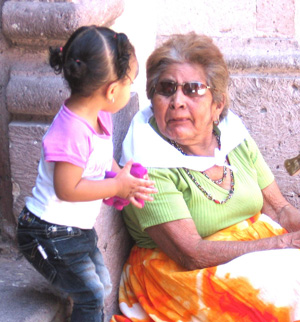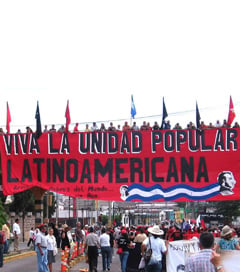Support justice-driven, accurate and transparent news — make a quick donation to Truthout today!
In Honduras, the repression of human rights, and peoples' resistance to it, are as old as the Spanish conquest. The current outbreak of both began with the June 28, 2009, military coup that deposed elected President Manuel Zelaya. Street protests against the coup were met with severe military and police violence, and opponents have created a new mass organization called the National Front for Popular Resistance (FNRP) with the goal of restoring and improving democracy in Honduras.
Although “Mel” Zelaya is himself a wealthy man, his term as president had offered hope for the workers, the campesinos and the poor of Honduras, where some 40 percent of the people live in extreme poverty on less that $2 per day. “Over the last year, Zelaya's positions moved to the left. He pushed social programs and more attention for the poor who have no work,” said Giuseppe Magno, the outgoing Italian ambassador. A former cabinet minister explained, “Zelaya wanted to help the country's poor, not nationalize industries or create a socialist economy.” President Zelaya ordered a large increase in the minimum wage, moved to convert some military facilities to civilian use, supported peasant cooperatives in land ownership disputes and planed a nonbinding popular vote on whether to revise the country's Constitution. His “new deal” involved reforms, not revolution, but it offended powerful interests in Honduras and in the US. The coup, led by two generals, both School of the Americas (SOA) graduates, came on the very day when the referendum on the Constitution was to take place and it put a sudden end to hopes that conditions of life for the majority of Hondurans might improve.
The Honduran coup was condemned throughout the hemisphere including, it seemed initially, by the United States. President Barack Obama called the coup “not legal” and warned that it could set a “terrible precedent.” But the United States rapidly dropped such criticism and never severed its close ties with the Honduran military – as US law required. More than that, this country recognized and currently supports the government of Porfirio Lobo, who was installed as president of Honduras after a highly dubious election in November 2009 that was managed by the coup plotters themselves. US backing for Lobo ignored a wave of popular protests against the coup within Honduras, protests answered by lethal violence from military and police that left dozens dead or disappeared and many hundreds beaten or arrested by the end of 2009. Few other nations joined the US in recognizing Lobo's “election,” and Honduras remained suspended from the Organization of American States (OAS) – until this June.
I visited Honduras in May with a delegation* led by Father Roy Bourgeois, the founder of SOA Watch, an organization working to close the SOA and change US policy toward Latin America. During our visit, President Lobo was welcoming foreign industrialists to a convention called “Honduras is Open for Business.” Foreign companies, especially United Fruit and its successors, have long dominated the Honduran economy, making it the original so-called “banana republic.” Today African palm oil groves have replaced many of the banana plantations, but the pattern of exploitation of the country's people and resources continues. “Open for Business” portrayed Honduras as a stable democracy and a good place to invest, but the people our delegation visited told us a different story.
Stay informed with Truthout updates delivered straight to your email inbox. Click here to sign up.
On May 1, we took part in the traditional mass march through the capital. The mood was positive, T-shirts with the letters FNRP were plentiful and speakers called for “taking power” through future elections. Starting later that day, visits to organizations such as COFADEH were more somber. This group was founded in 1982 by relatives of people “disappeared,” and presumably killed, by the regime. Today, its mission encompasses human rights in general and at their office we heard testimony about the new wave of repression unleashed against defenders of the legal government. Teachers have been especially hard hit, with confiscation of pension funds, mass suspensions, arbitrary firings and violent suppression of protests against government plans to privatize much of the country's public education.Already a year ago, COFADEH had documented 47 murders of coup opponents, 14 of them in the first months of the Lobo administration. Many more have been killed since that time.

(Photo: John Lamperti)
In the countryside, control of the land is the critical issue. The Lower Aguán Valley in northern Honduras has seen violent land struggles between campesino families and large businesses seeking to grow more African oil palms. Miguel Facussé, one of the nations' richest and most powerful men, has been at the center of conflicts leading to dozens of deaths. Our delegation visited campesino villages and organizations in the Aguán region and heard first-hand testimony about some of this violence. One met with members at “Guadelupe,” a peasant cooperative named for US-born Fr. James Carney (affectionately nicknamed “Padre Guadelupe”), still remembered although he was killed in 1983. There we talked with five widows whose farm worker husbands were shot by private guards on November 15 last year while trying to work their fields in a disputed area. The Aguán Valley has been heavily militarized and local people see little difference among the soldiers, police and the private guards of Facussé and others. Another death was reported as we ended our visit, and in the following weeks, the situation has turned even more deadly. At least five campesinos have been murdered in the region since early May, three others were kidnapped and “disappeared,” and several more seriously wounded. The FNRP has denounced a “climate of terror” in the Lower Aguán and small farmers there insist that the repression has never before been this bad.

(Photo: John Lamperti)
At the other end of Honduras, we visited a community radio station, La Voz de Zacate Grande, that has come under continuing attack for siding with local families whose land is claimed by, again, Miguel Facussé (among others). Similar and worse attacks have been frequent in Honduras since the coup. The French organization Reporters Without Borders (RWB), citing this case and others, has called the criminalization of opposition media “a sinister norm since the coup d'état of June 28, 2009.” RWB rated Honduras the most dangerous country in the world for journalists in 2010, when Amnesty International stated that at least ten reporters were murdered there. Seven of the ten were known as FNRP supporters.
None of the killers, in the cities or in rural areas, have been prosecuted; impunity is the rule. Bertha Oliva, the coordinator of COFADEH, whose own husband was “disappeared” by the military in 1981, testified in Washington before the Inter-American Commission on Human Rights. “You must not think that we live under a state of law,” she told the commission. “We live under state terrorism.”
While we were in Honduras, the government dropped trumped-up charges against former president Zelaya. This was one part of a deal, the “Cartagena Accord,” brokered by the presidents of Colombia and Venezuela to end Honduras's suspension from the OAS. Zelaya could now return safely to his country and so he did on May 28, flying home from Managua. On the plane with the ex-president were some 30 Latin American officials and social leaders and – Father Roy and his SOA Watch coworker Lisa Sullivan, who were, other than journalists, the only US citizens invited to take part. At the Tegucigalpa Airport, a huge and enthusiastic crowd, the largest in Honduran history, celebrated “Mel's” return, and he will surely play an important role in the opposition to the post-coup regime. No Honduran president can succeed himself, but Zelaya's wife Xiomara Castro may run for the office in 2013. On June 1, Honduras was duly readmitted to the OAS with strong US support, even though other provisions of the accord have not been fulfilled. Less that four weeks later, the FNRP, with Zelaya's participation, moved to create a political party, named the Broad Front of Popular Resistance, that will compete in future elections. The movement for real democracy should be ready to grow at many levels, but it faces an uphill struggle.
There is serious work for democratic forces in the United States, as well. Shortly after the coup in 2009, I wrote about two “lessons” our country should have learned from it: to cut all support for the Honduran military and to close the SOA. Neither has happened. Far from cutting military ties, the US has opened two new bases in Honduras and is about to add permanent facilities at its main location, the Palmerola Airport. Our government fully backs the Lobo regime, and Honduran soldiers continue to train at the “School of Coups,” as the SOA has long been known in Latin America. These policies must change.
At the Summit of the Americas in April 2009, two months before the Honduras coup, President Obama called for hemispheric relationships “based on mutual respect and equality.” He stated that we are “committed to combating [economic] inequality and creating prosperity from the bottom up.” Mr. Obama added, “We know that true security only comes with liberty and justice.” In response to a press question about US actions in Bolivia, the president was emphatic: “I am absolutely opposed and condemn any efforts at violent overthrows of democratically elected governments, wherever it happens in the hemisphere.” Many Latin Americans found hope in Barack Obama's election and in his words – but two years later those hopes have dimmed. Not least in Honduras.
In a major speech a few weeks ago (May 19), President Obama asserted, “The United States supports a set of universal rights. And these rights include free speech, the freedom of peaceful assembly … and the right to choose your own leaders,” adding, “We cannot hesitate to stand squarely on the side of those who are reaching for their rights.” Mr. Obama was speaking of the Middle East, but “universal” principles should also apply in Honduras. So far, apparently, they do not. Instead of the “change” we hoped for and expected, our country is once again backing the wrong side.
Footnote:
*Lisa Sullivan has posted a more detailed account of this delegation, entitled “Honduras: Open for Plunder.”
Media that fights fascism
Truthout is funded almost entirely by readers — that’s why we can speak truth to power and cut against the mainstream narrative. But independent journalists at Truthout face mounting political repression under Trump.
We rely on your support to survive McCarthyist censorship. Please make a tax-deductible one-time or monthly donation.
